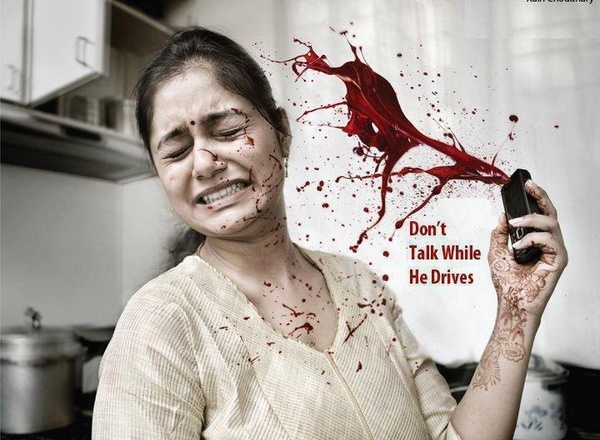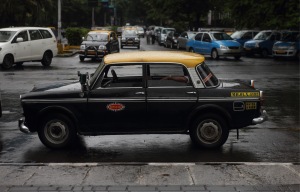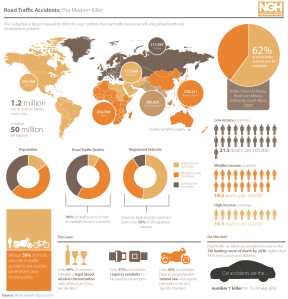
Monthly Archives: October 2013
Solving city’s traffic woes through strict law and civic sense enforcement

With around 400 deaths caused by road accidents and 8000 injuries reported daily, India tops the list of most road crash fatalities globally. Add to it the loss in productivity, fuel and environmental effects and the gravity of the current situation is unavoidable. The city of Mumbai alone witnesses numerous traffic snarls and mishaps every day affecting millions of commuters and pedestrians. The major cause for the same being an acute lack of civic sense in the citizens, the motorists and pedestrians alike. Although a lot of people have voiced their opinion on reducing the number of vehicles and constricting more flyovers/underpasses, it needs to be understood that good civic sense and ideal road and infrastructure usage can reduce our traffic woes to a great extent. Simple measures such as stricter law enforcement, adherence to disciplined driving and road usage following traffic rules and protocols can go a long way in positively changing the current scenario.
The government officials too opine that people in India cannot be governed and it is becoming increasingly difficult to enforce rules and regulations as people tend to leverage their clout with higher authorities and it gets increasingly difficult for law enforcement officials to function. But is this the sole reason? Of course voluntary adherence to laws and regulations is the basic duty of the citizens but more often than not adherence is a direct result of strict law enforcement.
This has been emphasized through the constructive actions taken by IPS officer Rishi raj Singh, Transport commissioner and ADGP Kerala. Road crash fatalities in Kerala have come down thanks to measures such as strict enforcement of speed regulations and compulsory helmets for motorcyclists. His efforts have sufficiently validated the fact that enforcing the rule of law and civic sense and discipline coupled with awareness can bring about the necessary change. It is important that similar necessary and constructive steps are taken to reduce the city’s traffic congestion and promote responsible and safe driving.
We are taking up the issue with the government authorities and the law enforcement agencies directly and also shall request media to help create awareness and pressure on the authorities. We look forward to your suggestion and support to take up better governance.
You can send your suggestions to info@theroadtochange.org.in
Enforcing civic rules and instilling civic sense

One gets feedback from Govt Officials that people in India can not be governed.
There is no character building in India. There is no civic sense or discipline in India. They can not enforce laws on people of India. They say people will complain to persons in Authority that they are being harassed.
Do you agree with this attitude or approach of the people who are responsible to govern and enforce law?
We would like to survey and provide report\your views to those in charge of governance.
But the vital objective is to also suggest how they should enforce the rule of law and enforce civic sense and discipline.
The areas where we want to take up this are:
- Pedestrian facilities and user and no jaywalking.
- Disciplined driving.
- No loud disturbing music\playing in neighboring areas
We are taking up the issue with the government authorities and the law enforcement agencies directly and also shall request media to help create awareness and pressure on the authorities. We look forward to your suggestion and support to take up better governance.
You can send your suggestions to info@theroadtochange.org.in
Improving Mumbai’s transport services with holistic solutions – Auto and Taxis

The fare hike for auto rickshaw services in Pune has inspired their Mumbai comrades to renew their demand for fare hike. According to the new fare hike, that came into effect on October 15 the base rate for Pune is Rs.17, making an auto ride costlier than in Mumbai. In Pune, the first 1.5 km will cost Rs.17 and every subsequent kilometer Rs 11.65. In comparison Mumbai’s current fare starts with Rs.15 for the first 1.5 km and Rs 9.87 for every subsequent kilometer. The union has cited reasons such as cost of living, cost of fuel, vehicle maintenance costs and low wages in context of the hours spent. This comes close on the heels of the continued demands by daily commuters for better measures and strict guidelines for operating auto rickshaws.
Although RTO cracked down on auto and taxi drivers refusing to ply in the past; better, inclusive and broader solutions are needed. The toll free helpline provided by the RTO (1800-22-0110) has received a total of 1,548 complains in the past year with an even more number of such incidents going unreported. With both the auto unions and the citizens demanding necessary changes, the RTO and the state government must lay down a set of measures and rules that address the issue holistically and ensure they are uniformly followed.
Our suggestion is as under
- The taxis and rickshaws should never refuse to ply
- Authorities need to be very strict against offenders
- Providing each vehicle (taxis and auto rickshaws) an identification card mentioning the working time and lunch/break times explicitly. This card should always be present in the vehicle.
- It is equally important that specific regulations are framed for compliance taking care of all the stakeholders.
- Working on a transparent and accurate method of fare revision calculations rather then bringing them into effect arbitrarily
We are taking up the issue with the government authorities and the service provider unions directly and also shall request media to help create awareness and pressure on the authorities. We look forward to your suggestion and support to take up better governance for stopping such incidents.
You can send your suggestions to info@theroadtochange.org.in or provide them through this google form https://docs.google.com/a/theroadtochange.org.in/forms/d/1yB1jHwcdYuMUcCBn7si2XWucaDYRm9AeGb7o4_aknxI/viewform
Tackling errant auto and taxi drivers refusing to ply.

The public transport service is for the benefit of the people, this aspect is totally lost sight of by regulatory authorities and the service provider unions. Though periodic crackdowns by the traffic police and the RTO against errant taxi and rickshaw drivers who refuse to ply are commendable and a step in the right direction, a more holistic approach is required to solve this issue effectively. We do endorse the present action however, it is important to have a balanced view in the interest of public and the people who are affected and connected to the service
Our suggestion is as under
- The taxis and rickshaws should never refuse
- Authorities need to be very strict against offenders
- Providing each vehicle (taxis and auto rickshaws) an identification card mentioning the working time and lunch/break times explicitly. This card should always be present in the vehicle.
- It is equally important that specific regulations are framed for compliance taking care of all the stakeholders.
We are taking up the issue with the government authorities and the service provider unions directly and also shall request media to help create awareness and pressure on the authorities.
We look forward to your suggestion and support to take up better governance for stopping such incidents.
You can send your suggestions to info@theroadtochange.org.in or provide them in this google form https://docs.google.com/a/theroadtochange.org.in/forms/d/1yB1jHwcdYuMUcCBn7si2XWucaDYRm9AeGb7o4_aknxI/viewform
Better governance needed to stop stampedes.
The incident where 113 have been dead and over 100 injured owing to a stampede at a temple in Madhya Pradesh, is not one such rare incident as the citizens of India helplessly face such losses many times all over the country.
During the last 20 years stampedes have taken place at Jodhpur (2008-249 dead), Ujjain (1996–39 dead), Delhi (1997–59 dead), Chennai (2005–50 dead), Nagpur (1994–114 dead), Satara (2005–300 dead), Bilaspur (2008–162 dead), Deoghar: Jharkhand (2012-12 dead), Kunda: Uttar Pradesh (2010–63+dead), Kumbh mela (2011–36 dead) Kumbakonam (1992–50 dead), Sabarimala (2011–106 dead) and yet we remain heavily and shockingly under-prepared for such situations.
Poor governance, lack of concern from government authorities and dismal crowd flow management are to be blamed for all such instances. But the majority of the concerned citizens, as the affected party every time, have been indifferent towards such issues and have failed to force the government to undertake and implement stringent measures to check and avoid the same. As victims, it is completely futile to wait for the government to take action on their own and establish a reliable system to prevent such incidents owing to their history of inaction and apathy towards the masses. It has become extremely necessary that the concerned citizens force the government and authorities involved through our collective and persistent efforts to bring much needed changes into the system. It is about time constructive steps are taken to establish a system in place that should include these critical measures:
- Listing all shrines and dates on which large number of devotees are expected
- Release a standard crowd management procedure and policy at the central and state level
- Assign the responsibilities for implementing and executing the same to local authorities and taking stern action on failure to do so
- Specify the administrative and resource support to be provided to such authorities
- Ensure effective and continuous supervision of such activities
- One of the central/state ministries should be in charge and made accountable
These measures are just initial recommendations; we need you, as our supporters to give suggestions. Collective and persistent efforts are required to make sure that Sunday’s stampede remains the last such incident.
We are taking up this issue with the central and state governments directly and also shall request media to help create awareness and pressure on the authorities. We look forward to your suggestions and support to take up better governance for stopping such incidents.

